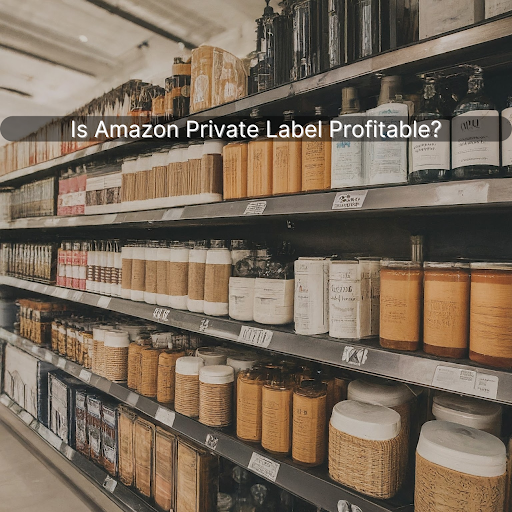Is Amazon Private Label Profitable?

As an experienced Amazon seller, you've likely explored various business models on the platform. One question that often arises is: Is Amazon private label profitable? In this comprehensive guide, we'll delve into unique aspects of private labeling on Amazon, providing you with valuable insights to enhance your profitability.
Understanding Amazon Private Label
Amazon private label involves selling products manufactured by a third party but sold under your own brand on Amazon. This model differs from retail arbitrage or wholesale because you have full control over branding, packaging, and pricing.
Quick Answer
Yes, Amazon private label can be highly profitable if executed correctly. Success depends on:
-
Selecting viable products with sufficient demand
-
Building compelling product presentation and packaging
-
Pricing intelligently to drive sales with good margins
-
Investing in marketing and promotions
-
Closely monitoring and optimizing listings
According to a report by Jungle Scout, 54% of Amazon sellers utilize the private label model, with profit margins ranging between 10-30% per unit at scale.
For more on optimizing product listings, read our guide on How to Improve Your Amazon Listings.
Pros and Cons of Selling Amazon Private Label Products
Pros
-
Full Control Over Branding: Customize packaging, logos, and product features.
-
Exclusive Listings: No competition on your product listings.
-
Higher Profit Margins: Cut out middlemen to increase profits.
-
Brand Building: Opportunity to create a recognizable brand.
-
Product Improvement: Ability to refine and improve products based on customer feedback.
Cons
-
Upfront Investment: Requires capital for product development and inventory.
-
Market Research Needed: Identifying profitable niches can be challenging.
-
Increased Competition: Rising advertising costs and competition.
-
Compliance Risks: Must adhere to Amazon's strict policies.
-
Supply Chain Management: Need to manage manufacturing and logistics.
Amazon Private Label Requirements
To succeed with Amazon private label, ensure you meet the following requirements:
-
Account Approval: Maintain a good standing seller account.
-
Product Compliance: Adhere to safety, testing, and labeling standards.
-
Intellectual Property: Avoid infringing on existing trademarks.
-
Inventory Tracking: Use unique FNSKU barcodes.
-
Fulfillment Standards: Comply with FBA or merchant fulfillment requirements.
-
Customer Service: Provide timely responses and a clear return policy.
Refer to Amazon's Seller Central guidelines for detailed requirements.
Is Amazon Private Label Still Profitable in 2024?
Despite increased competition, private labelling on Amazon remains profitable. Data indicates that over half of private label sellers have profit margins above 20%. Key factors contributing to profitability include:
-
Niche Selection: Targeting less saturated markets.
-
Product Differentiation: Offering unique value propositions.
-
Effective Marketing: Leveraging PPC and external traffic sources.
-
Operational Efficiency: Streamlining supply chain and inventory management.
Maximizing Profitability with Reimbursement Recovery
Did you know that you might be leaving money on the table due to unclaimed reimbursements from Amazon? Issues like damaged inventory or FBA fee discrepancies can affect your bottom line.
Here’s a short guide on everything reimbursement related.
Conclusion
Private labeling on Amazon offers substantial profit potential for experienced sellers willing to invest time and resources into product selection, branding, and marketing. By following best practices and staying vigilant about compliance and optimization, you can achieve significant success in the Amazon marketplace.
If you need personalized guidance or help fine-tuning your strategies, Superfuel AI can assist. Our AI-powered assistant analyzes 36+ key Amazon metrics to identify and address the root causes of sales fluctuations, helping you optimize your storefront and boost sales. Reach out to us at support@superfuel.io.
--
Ben Mathew, Amazon Expert
Ben Mathew is a co-founder at Superfuel, a sales assistant for Amazon sellers. In the past, Ben and his team of e-commerce specialists and software engineers have launched 40+ new brands on Amazon, taking them from zero to bestsellers. In his free time, he is either learning from other top sellers or encouraging his 3 daughters in their love for reading. He is reachable at ben [at] superfuel.io.
Frequently Asked Questions (FAQs)
How Long Does It Take to Launch a Private Label Product on Amazon?
Typically, it takes 6-10 weeks to go from product selection to launch, including sourcing, branding, and listing optimization.
What Is the Difference Between Private Label and Wholesale on Amazon?
-
Private Label: You sell products under your own brand.
-
Wholesale: You sell existing branded products purchased in bulk.
What Profit Margins Can I Expect with Amazon Private Label?
Sellers often aim for net margins of 20-30%, though this can vary based on product costs, advertising spend, and operational efficiency.
How Can I Increase My Private Label Profit Margins?
-
Optimize Advertising Spend: Focus on high-converting keywords.
-
Reduce Costs: Negotiate better rates with suppliers and logistics providers.
-
Expand Product Line: Increase sales volume with complementary products.
Is Amazon Private Label Saturated?
While competition has increased, there are still plenty of opportunities in underserved niches. Success depends on differentiation and effective marketing.